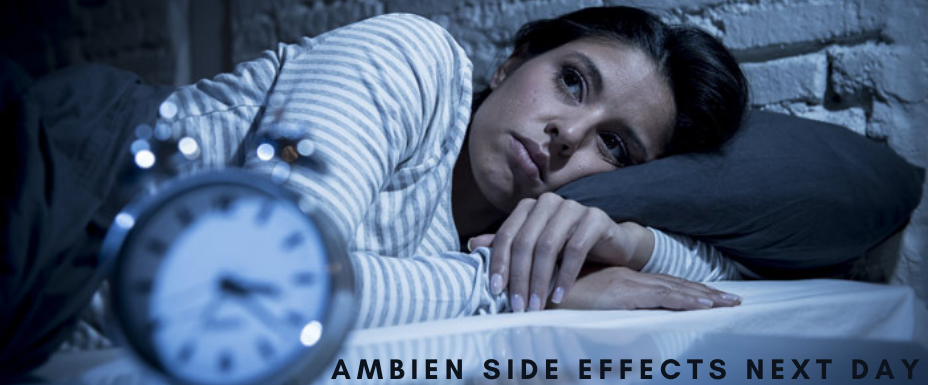Ambien side effects next day
Ambien side effects the next day
The sedative-hypnotic zolpidem tartrate is sold under the brand name Ambien. People who buy Ambien online to treat insomnia feel at ease, cozy, and sleepy when they take it as directed. The prescription medicine Ambien is classified as a Schedule IV substance by the United States Drug Enforcement Agency, meaning you need a prescription from a doctor to use it.
The Drug Enforcement Agency regulates this substance because of its potential for harm. Ambien abuse can lead to dependence and other Adverse effects. The only people who should take Ambien are those with severe insomnia and must see a doctor to get a prescription. Only treating insomnia for up to 35 days is the only indication for Ambien.
The effect of Ambien
Buy Ambien online to treat Insomnia and sleep-related problems. Continued use of Ambien might result in resistance to its effects. When this happens, insomnia worsens, and people often rely on increasing the prescribed medication dose. This is a habit that can have serious consequences.
Ambien: A sweet dream or a complete nightmare?
Depending on the time of the night and the dose of Ambien taken, the residual effect of the drug may continue until the next day. Some users claim that these effects are similar to a hangover from a night of heavy drinking.
- You may suffer from a headache hours after waking up the next day
- Memory loss
- Persistent drowsiness
- Gastrointestinal problems such as nausea
Ambien Side effects
Doctors refer to a specific issue linked to medicine as paradoxical excitation, which describes how some people who have taken Ambien display strange behavior while using the drug; some people drive a car, eat, or walk while still awake.
Patients won’t recall what happened because they won’t be conscious of their movements, and frequently they won’t find out until someone tells them when they are awake, such as knowing they were involved in a vehicle accident.

The U.S. National Library of Medicine lists the following as additional adverse effects of Ambien:
- Drowsiness
- Headache
- Sense of lightheadedness
- Walking difficulty
- Difficulties with balance
- Diarrhea
- Heartburn
- Stomach cramps
- Weak emotions
- The appetite shifts
Serious side effects of Ambien
Since Ambien slows down the brain, the most severe side effects of Ambien are related to its impact on the brain. These include:
- complex sleep behaviors (sleepwalking, sleep urges, etc.)
- The next day’s mental illness
- Confusion and severe disorientation
- Hallucinations
- Depression
- Suicidal tendency
- Severe allergic reactions such as a sharp drop in blood pressure and shortness of breath
Dependence, abuse, and withdrawal
Ambien 10 mg contains FDA black box warnings for complex sleep behaviors (normal arousal activities performed during sleep, such as sleepwalking or similar activities).
The intricate sleep patterns caused by zolpidem can lead to injury, death, and even murder. If a complex sleep pattern occurs while taking the drug, Ambien will be stopped immediately.
Due to the risk of addiction and abuse, Ambien is classified as a controlled substance by the Drug Enforcement Agency (DEA) and not approved for long-term use. Also, zolpidem worsens depression, so Ambien should not be taken by people with depression.
People taking the prescribed sleeping pills are 3-5 times more likely to die or have cancer than those who are not taking sleeping pills. The reason for this is not well understood. However, the risk is dose-dependent and is lowest for people who take sleeping pills only a few times a year.
Ambien Memory Loss
In clinical studies, Ambien caused clinically significant memory loss in less than 1% of patients taking the recommended dose.
If Ambien affects memory, the patient will not lose existing memory. Instead, the brain loses the ability to form new memories. Although clinically significant memory loss is infrequent, almost everyone who buys Ambien online to treat Insomnia experiences some degree of memory loss. The effect is temporary, and stopping the drug will improve memory.
Ambien is also associated with an increased risk of dementia (general deterioration of mental function) in the elderly. For this reason, the recommended dose for the elderly is half that of adults.
Ambien Hallucinations
In clinical trials, less than 1% of patients reported visual or auditory hallucinations. Hallucinations are more likely experienced by people with pre-existing neurological disorders such as attention deficit hyperactivity disorder (ADHD), mental illness, or other psychoactive medications. Hallucinations are more common in children and the elderly than in adults. Patients taking Ambien may be experiencing severe confusion.
How long do the side effects of Ambien last?
In less than a day, the body quickly metabolizes Ambien, causing its levels to drop to undetectable levels in the bloodstream. However, higher amounts may also stay inside the body for up to three days. The majority of side effects no longer last longer than those times.
If Ambien is taken frequently or in high doses, withdrawal symptoms may also appear six to eight hours after the drug is stopped working and linger for one to two weeks.
Warnings and contraindications for Ambien
Medical facilities can monitor patients carefully and can prescribe Ambien with caution. Several red flags, such as complicated sleep patterns, allergic reactions, depression, underlying medical conditions, records of substance abuse, and other current conditions, may also prompt a healthcare provider to either avoid prescribing the drug in the first place or terminate an existing prescription.
Complicated sleeping habits
Patients who have experienced complex sleep behaviors are not prescribed to buy Ambien online since it may also trigger complex sleep behaviors like sleepwalking, driving while asleep, eating while numb, and similar sleep disorders. At the first instance of complex sleep behaviors, Ambien could be immediately stopped.
Depression
Ambien is administered cautiously to depression sufferers since it can worsen depressive symptoms and signs. Also, SSRIs and MAO inhibitors may interact negatively with Ambien, so those prescriptions may need to be changed.
An underlying psychological condition or physical infection is typically indicated by difficulty falling or keeping asleep. Ambien won’t be the best solution if the underlying problem can be handled. Therefore, a thorough physical and psychological assessment must be completed before Ambien is prescribed.
Quitting Ambien
According to scientific investigations, Ambien causes dependence and withdrawal in less than 1% of patients when used as prescribed. However, dependence and withdrawal are more likely if Ambien is used frequently or in high dosages.
Depending on how much Ambien is taken and how quickly it is stopped, withdrawal symptoms can range from mild to severe. These symptoms might appear within a few hours of abruptly stopping the medicine, reducing the dosage, or skipping a dose.
Sleep problems (insomnia), anxiety, drug cravings, impatience, aggression, temper swings, tremors, exhaustion, panic attacks, and rapid heartbeat are among the symptoms. Seizures are the most severe withdrawal signs and symptoms.
Overdose on Ambien
People buy Ambien online to treat sleep difficulty problems. When used as directed, 5 to 10 mg per 24 hours, Ambien is a generally safe medicine. When taken in excess (70 mg in 24 hours), Ambien or other similar depressants can have dangerous and even fatal side effects. Because Ambien slows the brain predominantly, an overdose may cause confusion, delirium, unconsciousness, or coma. Additionally, it decreases respiration and heart rate, which could be fatal. There have been fatalities linked to Ambien overdose.
Conclusion
Ambien has the same side effects as most medications. Most of Ambien’s adverse effects, such as tiredness, dizziness, motor dysfunction, sluggish reflexes, and decreased alertness, are due to the drug’s sedative effects on the brain.
In addition, many reports of sleepwalking and night-eating syndrome (or sleep-eating) can occur, especially in multiple dosing situations. The person suffering from Ambien addiction and overdose must consult with their doctor before continuing the medicine.



